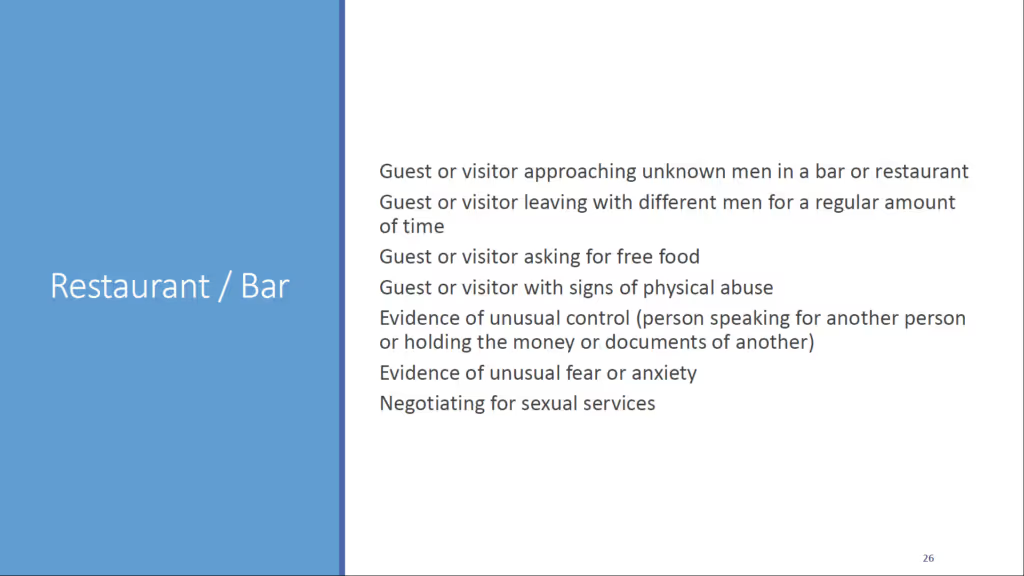The Osceola Resort Area Council invited their whole membership, and members of the public, to an open meeting on Tuesday, June 18 at Ramada Kissimmee Gateway. Representatives from the Osceola County Sheriff’s Office were present to share tips on staying safe in the corridor and the tourism industry as part of ORAC’s second ever Tourism Safety “In the Know” Seminar.
Here’s a summary of what was learned about identifying signs of human trafficking, safeguarding against credit card fraud, and protecting your business from vulnerabilities.

Human Trafficking
Human trafficking involves the use of force, fraud, or coercion to obtain some type of labor or commercial sex act. It can also be known as modern day slavery. There are two types of trafficking:
Trafficking s a hidden crime. Sadly, we may not recognize the signs even when it’s happening right in front of us. As reported by the Florida Department of Children and Families (DCF), there were a total of2,133 reports of human trafficking maltreatments for state fiscal year2017-2018. The top business venue for labor trafficking is agriculture and the top venue for sex trafficking is hotels and motels. (Note: these are two of Osceola County’s top industries.)
Want to help? Be aware, ask questions, and alert law enforcement. Major indicators of human trafficking can be observed in hotel lobbies, at reservations desks, at hotel check-in, by house keeping, and in restaurants and bars.
Below are potential signs of human trafficking that you and your staff should be cognizant of.





In addition to the shattered lives and trauma that result from human trafficking, businesses can be negatively affected when human trafficking is found on their premises. A loss of reputation, additional security concerns, and liability risks are all to be considered as probable side-effects of human trafficking.
Credit Card Fraud

Credit card fraud can be very tricky. It can be quite difficult to prove. Here are some precautions advised by law enforcement when accepting credit card payments for hotel reservations. Remember, businesses should be sure to get a BRC (business record identification) to authenticate any video or documents you provide to law enforcement in a fraud case:
Other suggestions from law enforcement to guard against fraud include:
Finally, here are some tips for everyday life:
Business Security Surveys

In the tourism industry, as in any industry, first impressions matter. Businesses must keep their appearances appealing to attract happy, honest customers, and to dissuade criminals.
The Osceola County Sheriff’s Office provides business security surveys to businesses within the County. A business security survey takes about an hour (in most cases), and provides a proprietor with both an analysis of potential security risks to their facility and operations, and recommended improvements.
Benefits of a business security survey include:
Business owners, operators, and managers must not give criminals the opportunity to commit wrongdoings. There are ways to prevent and avoid bad situations. One of these is Crime Prevention Through Environmental Design(CPTED). CPTED is the proper design and effective use of the built environment to help decrease a criminal’s ability to commit a crime, or increase the chance that the crime will be seen and reported.

To schedule a business security survey contact the Osceola County Sheriff’s Office Community Services Unit at 407-348-1190.
ORAC is grateful to the Sheriff’s Office and Department of Corrections for sharing their expertise with us, and to Ramada Gateway for being an excellent host. This event was sponsored by the following tourism industry partners: Experience Kissimmee, Old Town Kissimmee, Magic Development, West 192 Development Authority, Kenney Communications, Medieval Times, Walt Disney Parks & Resorts, and Wild Florida.
_______________________________________________
Amanda Hidalgo contributed to this blog post.

Christina was raised in St. Cloud and holds degrees from the University of South Florida and the University of Central Florida. She joined the Chamber in April 2015. As Director of Administration, she manages the Area Council’s events, sub-committee meetings, projects, and board engagements.
Learn how your Chamber membership can help you gain visibility within the Osceola business community - including placement on our website.
Explore Membership Benefits